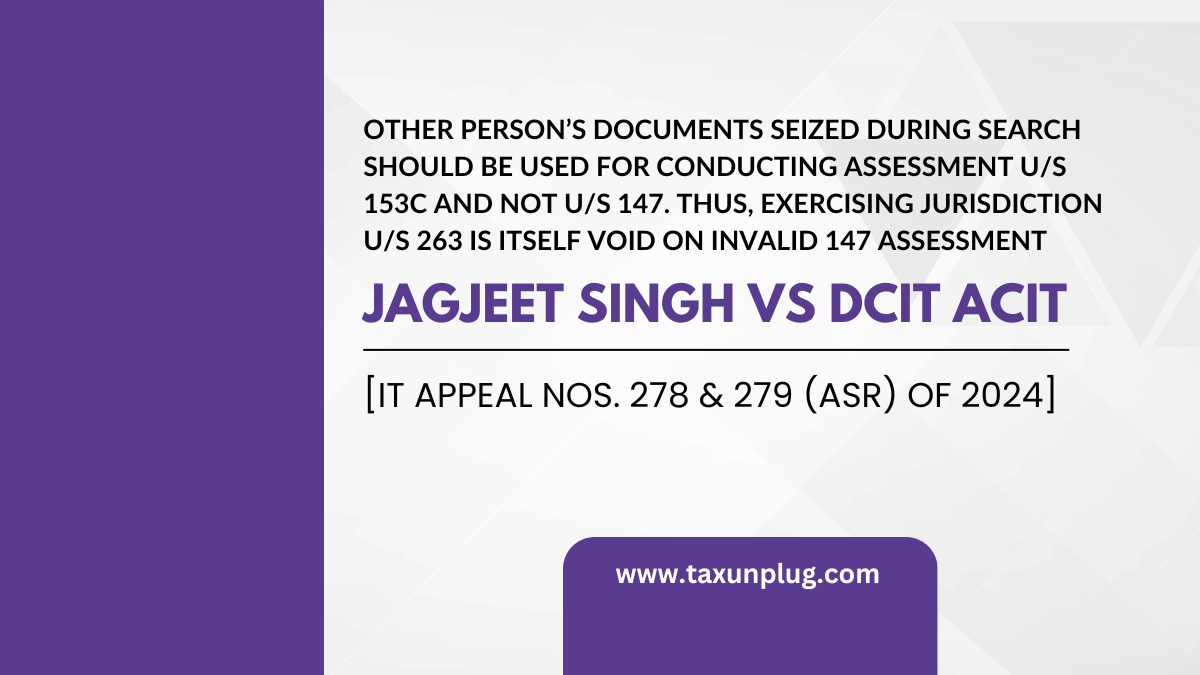Jagjeet Singh vs DCIT ACIT [IT APPEAL NOS. 278 & 279 (ASR) OF 2024]
The assessee filed an income tax return for the AY 2017-18, declaring an income of Rs.61,92,130/-. A search operation was conducted on 26.02.2020, and a copy of the ledger account of Sh. Jagjeet Singh was seized from Homeland Group’s premises. The case was reopened under Income Tax Act and notice u/s 148 of the I.T Act, 1961 was issued on 30.03.2021. The assessee filed a return of income on 18.05.2021, declaring a total income of Rs.61,92,130/-. The assessment was completed on 24.03.2022, and the returned income was accepted by the AO.
The Ld. PCIT filed a case u/s 263 of the Act, claiming the assessment order was erroneous and prejudicial to revenue. They alleged that the AO failed to verify unexplained cash transactions in the ledger account during the demonetization period in November 2016. The PCIT argued that the appellant relied on provisions not applicable in income tax.
The appellant argued that the PCIT’s order u/s 263 is illegal and bad in law, as it was completed without jurisdiction and based on unsigned reasons.
The case was reopened based on documents found during a search on Kapil Romanna (Homeland Group). The assessee objected to the reasons recorded, which were disposed of. The appellant responded with documents, stating he had no connection to the transactions mentioned in the reasons and denied giving any cash loan to Kapil Romanna. Objections were raised to the reasons recorded, stating he was not involved with transactions on the ledger account seized from Kapil Romanna’s premises.
The Ld. AR confirmed that the AY 2017-18 assessment was completed after verifying the respondent’s documents. The AO accepted the return of income of Rs. 61,92,130/-, finding the transaction unrelated to the appellant. The AR further argued that the order passed by the Assessing Officer was not incorrect.
The AR relied on the High Court of Bombay’s judgment in the Great Eastern Shipping Co. Ltd. case, which emphasized that unsigned or draft reasons cannot be considered final reasons, violating procedural norms and compromising fairness, transparency, and accountability in assessment proceedings.
The appellant’s AR argued that the revision order passed under u/s 263 was invalid due to the non-jurisdictionality of the original order under u/s 147 r.w.s 144B, and that the proper course of action was u/s 153C, not section 147. This deemed the subsequent proceedings invalid.
The Ld. AR argued that the assessment order u/s 147 is based on material discovered during a search, and therefore, the assessee’s assessment proceeding should be initiated u/s 153C of the income tax act, 1961.
The AR ruled that the original assessment u/s 147 was without jurisdiction, making the revisions u/s 263 void. The legal maxim “sublatofundamentocadit opus” suggests that when the cause is removed, the effect ceases. This is supported by the apex court’s judgment in Krishna Singh v. Chaman Paswan, which states that an order without jurisdiction is invalid.
After hearing both sides, the Hon’ble Tribunal found that the original assessment order was invalid due to unsigned reasons.
The case was framed based on material found during the search, requiring action under u/s 153C instead of u/s 148. The AO erred in invoking reassessment proceedings under u/s 147, and the subsequent cause of action is deemed without jurisdiction. This view is supported by the Hon’ble Apex Court case.
The revenue cannot prove the Assessing Officer’s order was erroneous or prejudicial to the revenue’s interests. The PCIT cannot prove the AO’s application of mind, given the order of Kapil Romanna was passed on 29.09.2021 and the appellant’s order on 24.03.2022. Kapil Romanna failed to identify the parties from whom the loan was raised, and the addition was made in his hands.
The Hon’ble Tribunal disagreed with the PCIT’s finding that the AO did not verify transactions in the Homeland group’s ledger account and that the order was passed without application of mind and held that the order passed under section 263 is bad in law and it should be quashed.
Thus, both the appeals filed by the assessee were allowed.
To download official order, click here.
“The site is for information purposes only and does not provide legal advice of any sort. Viewing this site, receipt of information contained on this site, or the transmission of information from or to this site does not constitute an attorney-client relationship. The information on this site is not intended to be a substitute for professional advice.”

